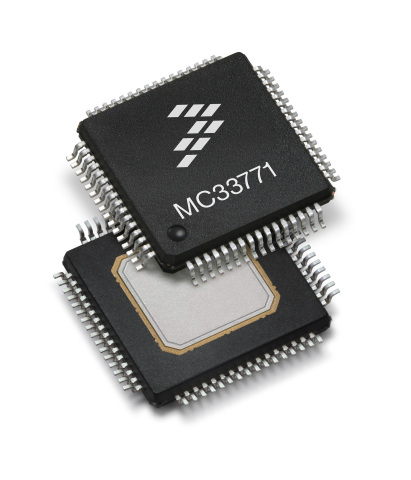New product balances measurement accuracy, scalability and high speed isolated communications for automotive and industrial battery management
NOVI, Mich. — (BUSINESS WIRE) — September 16, 2014 — (Electric and Hybrid Vehicle Technology Expo) – Freescale Semiconductor (NYSE: FSL) today announced a highly integrated 14-cell lithium-ion battery cell controller for industrial and automotive applications, designed to cost effectively meet the stringent requirements for ASIL-C functional safety.

Freescale's new MC33771 battery cell controller (Photo: Business Wire)
With fourteen cell balancing transistors, a current sensor with ±0.5% accuracy from milliamps to kiloamps, and 2 Mbps communication transceiver interface integrated into a single 64-pin QFP package, Freescale’s MC33771 battery cell controller and companion MC33664 isolated communications interface deliver robust, reliable performance for 48 V battery systems, enabling economical scalability beyond 1000 volts. The solution’s built-in diagnostics help protect automotive and industrial battery packs against critical fault conditions, and its transformer coupled isolated high speed transceiver eliminates the need for expensive isolated CAN busses to meet ASIL-C requirements. Together, these features make the solution ideal for a broad range of automotive and industrial applications including 48 V battery packs, hybrid and electric cars, E-bikes and energy storage systems.
As automotive and industrial batteries are placed under increasing strain by new, mission-critical applications, challenges such as overcharge, overheating and internal short circuit or overload must be controlled in order to help ensure safe operating conditions. It is crucial that the battery cell controller provide precise and reliable battery diagnostics by accurately measuring differential cell voltages, temperatures and currents. It is equally critical that this information be communicated quickly and accurately from the battery cell controller to the pack controller for system-wide control and safety of the battery, allowing the full energy content of the battery to be utilized.
“The robust design and comprehensive integration of our new battery cell controller reflects Freescale’s system-level approach to cost effectively manage battery charging while helping to prevent failures and dangerous conditions,” said James Bates, senior vice president and general manager for Freescale’s Analog & Sensors Group. “This new battery cell controller leverages Freescale’s automotive heritage and long history of creating reliable, highly integrated, high-performance solutions to reduce the cost of meeting stringent safety requirements.”
The MC33771 incorporates many critical functions required for controlling a single 48 V battery pack, including the capability to synchronously measure currents and voltages with 2 millivolts of accuracy within 65 us, making it easier to meet ISO 26262 ASIL-C requirements. Embedded functional verification and fault diagnostics enable compliance with ISO 26262 ASIL-C functional safety standards without additional external circuitry. For higher voltage systems, the integrated daisy chain differential transceiver communicates at 2 Mbps using robust transformer coupled isolation up to 3750 volts instead of expensive isolated CAN busses, while the MC33664 connects the battery pack directly to the system MCU’s dual SPI interface using the same transformer coupled isolation. Freescale’s battery cell controller solution delivers exceptional performance with a lower system bill of materials and robust system isolation for ASIL-C rated battery packs.
The MC33771, in combination with Freescale’s MC33664 isolated communication device, supports optimal lifecycles for a variety of battery architectures, including centralized, distributed CAN and distributed daisy chain topologies. The battery cell controller features a robust and safe high-speed daisy chain communication design that serves as a replacement for expensive isolated CAN busses. The device’s ability to serve as an alternative to CAN-based solutions eliminates the need for local microcontrollers, voltage regulators and isolated CAN layers within the battery, helping to reduce costs and design complexity.
The MC33771, a SafeAssure functional safety solution, has been developed to enable customers to easily meet stringent ISO 26262 ASIL-C requirements, as well as rigorous standards for ESD, EMC, low current consumption and AEC-Q100 automotive qualified design. While Freescale’s MC33771 is usable across most known battery topologies, it features a specific feature set to address a typical 48 V LFP Battery with one device that includes fourteen differential voltage measurements, fourteen embedded cell balancing transistors, seven analog inputs for temperature measurement, one embedded current sensor that synchronizes with the cell voltage measurements to allow determination of individual cell impedance, and a coulomb counter for enhanced state of charge determination.
Additional features include:
- 9.6 V ≤ VPWR ≤ 61.6 V Operation, 70 V transient
- SPI or isolated 2 MHz differential communication
- Current sensor with ±0.5% accuracy from milliamps to kiloamps
- 14x differential cell voltage measurement and stack voltage measurement
- Synchronized cell voltage/current measurement
- Coulomb counting
- 7x ADC/GPIO/temperature sensor inputs
- Addressable on initialization
- Onboard 300 mA passive cell balancing
- Low-power modes
- 64-pin QFP package

